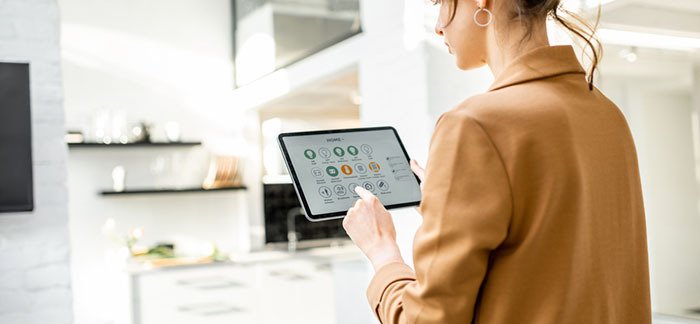Smart Home Upgrades You Can Do Yourself

When you think of a smart home, what comes to mind is an image of a home fitted with numerous devices and appliances that can be controlled remotely. However, a smart home can mean different things to different people.
For some people, it means buying something as simple as a smart speaker, while for others it means upgrading a home with many interlinked smart devices. If you are thinking of upgrading your home with smart devices, this article will provide you with all the information you need.
In the following sections, we’ll look into some smart home upgrades you can do yourself.
What is a smart home?
A smart home is essentially a home that has a remote-controlled smart home system, which helps in automating tasks. Smart home devices can be built into a home or added in the form of upgrades later.
Smart home devices can be controlled by different means, like remotes, voice commands, apps, switches, or even artificial intelligence. When you make your house “smarter” by adding smart home upgrades, it can help you in streamlining chores and also save on energy costs.
DIY Smart Home Projects
If you’re wondering about some smart home projects you can carry out yourself, here are some great suggestions to get you started.
1. Smart Locks
You can consider installing a smart lock in your home that will allow you open doors remotely. It will save you the hassle of getting up every time you have to open the door for guests.
Most smart locks range between $150-300 and can be operated using an app. Some advanced smart locks also come with facial recognition technology.
You can easily install these smart locks in your home with the help of a screwdriver.
2. Smart Light Bulbs
Installing smart light bulbs is a fairly simple home project that can be done easily. What’s better is that it does not require any tools.
Most smart light bulbs retail for around $8, while the advanced ones could range around $50. They usually come with color-changing modes that can be controlled remotely using an app. Some smart bulbs support voice commands too.
For installing these bulbs, you do not need any additional hardware. All you have to do is screw in the bulb in the sock and connect it with your device using the app. And voila! You have yourself a smart home with remote-controlled light bulbs.
3. Smart Thermostat
If you want to save on the costs of heating/cooling in your home, upgrading to a smart thermostat can be a great option.
Smart thermostats range from around $100-250 and they are usually equipped with energy-saving mechanisms to help you save money.
Installing a smart thermostat is a fairly simple home project. All you would need is a flathead screwdriver, screw gun, and a drill. You can follow the instructions given in the manufacturer’s manual for installing the wiring.
4. Smart Water Sensors
Smart water sensors can be attached to water heaters, washing machines, and other appliances that have common leakage problems.
Smart water sensors usually range from $40-400, depending on the area you want to cover. These are great additions to your homes if you have occasional problems with leaking and flooding. Some sensors are also able to detect temperature changes, which can help in combating the problem of frozen pipes.
No additional tools are required for this project either. All you would have to do is install a battery-operated Smart Water Sensor and connect it with an app to get alerts whenever there are any leaks.
5. Smart Outlets
This is another great device for saving energy and money. Smart outlets usually range from $12-60 and can help in turning things off and on remotely.
You do not require any tools to install the smart outlets either. All you have to do is install them in the existing outlet and set the features you wish to control remotely.




